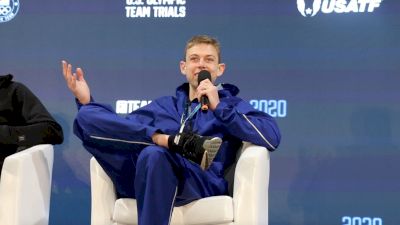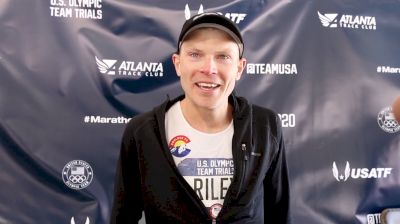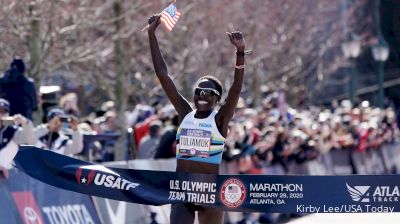Galen Rupp Gets His Groove Back As Riley, Abdi Surprise In Atlanta
Galen Rupp Gets His Groove Back As Riley, Abdi Surprise In Atlanta
Galen Rupp conquered doubts about his fitness with another dominant Trials win, while an unlikely pair completed the men's 2020 U.S. Olympic Marathon team.
Much has changed for Galen Rupp since he won the 2016 U.S. Olympic Marathon Trials in Los Angeles.
His coach since high school, Alberto Salazar, is currently banned from the sport for anti-doping violations, in his place Mike Smith, a collegiate coach at Northern Arizona University. The famous skull logo that used to adorn his racing kit is also gone, as Salazar’s Nike Oregon Project training group was a casualty of his punishment. Rupp now wears the same Nike gear as many other athletes who represent the brand.
Ahead of the 2020 U.S. Olympic Marathon Trials on Saturday, the 33-year-old also seemed to be missing the air of invincibility that he showed in his marathon debut in 2016. Achilles surgery in 2018 and a calf strain last October in Chicago that forced him to drop out made his fitness a significant question mark entering this race.
The confluence of factors made Rupp look potentially vulnerable in Atlanta. He had, after all, not finished a marathon in over 500 days, and on a brutally hilly course with howling wind, any deficiency would be exacerbated on Saturday.
But even in conditions that couldn’t have been more different from the searing heat and flat terrain in Los Angeles at the 2016 marathon trials, the result was very much the same for Rupp as he once again went unchallenged in the final miles en route to a convincing 2:09:20 victory.
Any doubt about Rupp’s position atop U.S. marathoning in the wake of his troubles has been answered emphatically: Galen Rupp is still way better than everyone in the United States. The physical struggles to get back to this point created by the Achilles surgery and subsequent imbalances in his form made Rupp feel like he had to relearn how to be the elite marathoner he was before. It was almost like a return to Los Angeles when Rupp entered the marathon as a newcomer.
“In a lot of ways there are some similarities to 2016 because I feel like a totally new athlete coming off of surgery a year and a half ago,” Rupp said on Saturday.
“I picked up a lot of bad habits coming into this. Mechanically I wasn’t that sound when I ran in Chicago last year. It’s been really tough. It was almost like I was a newbie again to this event.”

During the NBC race broadcast on Saturday, announcer Craig Masback mentioned that part of Rupp getting back to himself was finally listening to what his body was telling him post-surgery. Rupp developed a limp due to changes in his form during training, and it took his wife speaking out on it for Rupp to seek out a new physical trainer to correct his poor mechanics.
“I took for granted waking up, being able to get out of bed, walk without pain, being able to go play with my kids, just walk around my house,” he said.
“The last several months have just been about getting healthy and getting my mechanics good and getting everything working again like it was when I was healthy before I had surgery.”
Rupp showed he was on the right track three weeks ago when he ran a 61:19 half marathon in Mesa, Arizona, but his run on Saturday made clear that that was just a taste of how his fitness had progressed since the fall.
Once Rupp caught early leader Brian Shrader, a 2:13 marathoner who boldly ran the first half in 64:53, at the 16-mile mark, the 2016 Olympic bronze medalist began a series of surges to test the men around him.
From miles 16-18, Rupp split 4:50, 4:40 and 4:48, a segment that left just four men in the main pack with eight miles to go (Runner-up Jake Riley would eventually join the chase group behind Rupp). It wasn’t about running away from everyone just yet, but instead, a tool to see how damaging his final move would be when he really went at 20 miles.
One of the men who successfully weathered Rupp’s first jabs was 43-year-old Abdi Abdirahman, a four-time Olympian who was on his way to his fifth team and the distinction as the oldest U.S. Olympic marathoner ever. Abdirahman, who won the 10,000m at the 2008 U.S. Olympic Trials over a 22-year-old Rupp, shouted encouragement to Rupp to keep cranking down the pace on Saturday when he first began surging.
“Abdi kept telling me, ‘Keep pushing, we got it! Keep pushing.’ I really wanted to wait a little bit,” said Rupp. “When it was time to really go around 19, 20, I used that experience going up at mile 15 to see that I was able to get a little gap there.
I had a lot of confidence that when I went again, I’d get a gap and then at that point it’s just about continuing to keep the pressure on, keep pushing.”
The race for first was essentially over at 21 miles when Rupp’s lead ballooned to 17 seconds, but the battle for the final two spots to Tokyo (or more accurately, Sapporo) was just starting to take shape.
With five miles to run, the chase pack consisted of Abdirahman and two surprising contenders in Augustus Maiyo and Matt McDonald, who held 2:12 and 2:11 bests, respectively. Lingering 10 seconds back from them was 2:07 man Leonard Korir, while unsponsored 31-year-old Jacob Riley was starting to make up ground and found himself 20 seconds behind Korir.
By 23 miles, McDonald had fallen off, leaving Abdirahman, Maiyo and Korir in lockstep and Riley quickly catching up. 11 seconds behind that trio at 23, Riley had cut it to two seconds by 24 miles with a 4:59 split.
Riley, a former All-American at Stanford and a member of the Hansons-Brooks Distance Project until 2016, was on no one’s radar as an Olympic contender until he finished as the top American in Chicago last fall in 2:10:36. Prior to that, he hadn’t raced a marathon since 2016 due to an achilles injury that ultimately required surgery.

Riley has also dealt with difficulties away from the sport in the course of his return to competitive running, as he shared on Thursday at the pre-race press conference.
After four years as a full-time professional runner from 2012 to 2016, Riley struggled to find work despite holding an engineering degree from Stanford. He also separated from his wife. Riley weighed retirement on multiple occasions during this time, but he ultimately found a new running home with coach Lee Troop and the Boulder Track Club while attending graduate school at the University of Colorado.
“I know that everybody goes through adversity. I don’t want to downplay mine and I know a lot of people have gone through their own bit of stuff, but it’s been a really long return,” Riley said on Saturday.
“I spent three years rehabbing an injury. I was never entirely sure that I was going to get back to professional running, period, let alone be this competitive.”
But Riley had, against all odds, put himself in prime position to make the team with one mile to go. The race for the final two spots was down to Riley, Abdirahman and Korir, as Maiyo was fading by 25 miles.
Riley and Abdirahman had a second on Korir crossing 26 miles, not exactly a comfortable margin given Korir’s superior track speed. But the 27:20 10,000m runner appeared gassed once the trio entered the brick-covered final straightaway, and he was unable to make up the gap. He was fourth in 2:10:06.
Riley held off Abdirahman for second in 2:10:02, with Abdi a tick back in 2:10:03.
Such was the excitement of the final sprint that Riley reached out and grabbed from a spectator one of the small American flags usually reserved for runners whose Olympic spot is 100-percent secure, a move that could have been disastrous if he finished fourth.
Fortunately for him, though, Riley had enough speed to avoid an embarrassing moment. He crossed the line with an emphatic scream while clutching the red, white and blue keepsake.
“I regretted it after I took it. I was like, ooh, I’m kind of calling my shot right now. I knew I had at least one more go in me and I knew it was going to be a downhill I could kind of slingshot off of."
"Yeah, in retrospect that was probably a bad move and it was little bit of a cocky move," said Riley.
Abdirahman, who set the U.S. masters marathon record of 2:11.34 last November in New York City, lowered that mark by over 90 seconds on Saturday to add another mythical element to his incomparable resume. But that “oldest U.S. Olympic marathoner” label, that’s not one that Abdirahman plans to embrace.
“That means nothing to me, to be honest. I consider myself an athlete, that’s the way I look at it.”
